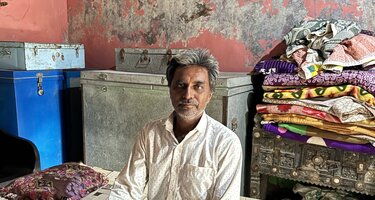Two Fathers, One Vision for Their Children’s Future
Ashok and Bhura, two fathers from rural Gujarat, share the hope that their children will have opportunities they never had. They live in close-knit communities where traditions run deep. Both have seen significant changes in their children’s lives over the past few years since the project From Field to Fanshop started. It has triggered changes in their communities that have shifted perspectives on education, sport, and gender equality.
New chances for education
Ashok, a millet farmer with three children, has always valued hard work and education. However, he recently noticed a transformation in his children that surprised him. "We often hear our son say that he is learning about football and other sports at school, as well as becoming aware of the importance of eating healthy food and washing hands before and after meals," Ashok shares. "His perspectives towards life have changed; he’s interested in studying at university now."
Bhura, who lives in Ratanpur Khadir and works in agriculture, has also witnessed a significant shift in his daughter’s behaviour. "My daughter was once addicted to her mobile phone, but now she’s involved in sport and more interested in her school career," Bhura says proudly. "She’s even thinking about attending college to continue her education."
The emphasis on hygiene and cleanliness is another positive change that Bhura has observed, just like Ashok: "Our children now practice good hygiene habits like washing their hands regularly and encourage us to do the same. This is a big change from how things used to be."
For Ashok, the introduction of sport in his children’s lives has been a game-changer: "It’s a great idea. After playing, children are more focused on their education. They learn important values and take better care of their health.”

Ashok, Copyright: YFC
Traditional points of view change slowly
However, when it comes to gender equality, both fathers agree that there are still challenges that come with balancing tradition with progress. "In remote communities like ours, girls get fewer opportunities than boys and do not focus on their education," Ashok explains. While he supports education for girls, he also believes that they should focus on household chores and help in the fields after their homework.
Bhura has a somewhat more progressive outlook: “I’m happy to see that girls get the same opportunities to move forward in life”, he reflects. However, he’s acutely aware of the barriers that still exist. “In villages, girls are often married off young and not allowed to engage in sport or continue their education beyond a certain point. Traditional views make it difficult for them to leave the community.”
A shared vision
Both Ashok and Bhura agree that the opportunities their children are receiving could shape a brighter future for them. While Ashok hopes that the new experiences will lead to a more balanced life for his children, Bhura sees these changes as a stepping stone toward greater equality and opportunity, especially in education.
Their stories highlight the complexities of life in rural India, where initiatives like From Field to Fanshop must navigate the delicate balance between tradition and modernity, societal norms and individual wishes. Yet, despite these challenges, the transformation in their children’s lives offers a glimpse of hope for a future where boys and girls can thrive equally.
